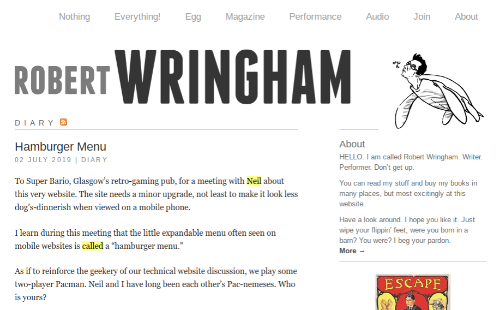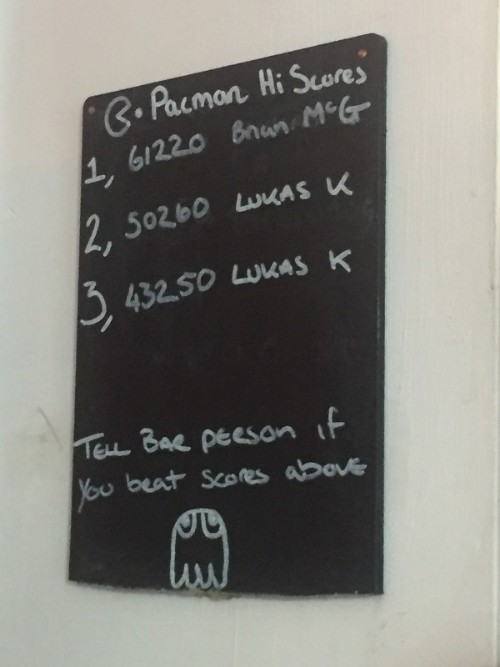Our final morning in London.
We’d been staying with my friend Wentworth and his wife Amelia. We don’t know Amelia all that well, so it was extremely kind of her, I felt, to let her husband’s layabout friends sleep in her house.
My alarm went off at 10:37 so we could begin our dash to Euston at the absolute last possible second, as is customary. On my way to the bathroom, I had pass Wentworth and Amelia’s bedroom door. It was open and I could see a humanoid shape on one side of the bed.
I had sleepily heard the front door being softly closed shut at about 7:30, which I’d taken to be Wentworth going off to work. I didn’t know Amelia’s schedule, but I’d imagined that she’d have gone to work by now too. If she was still in bed so late, I reasoned, perhaps she was ill.
It struck me as a bit strange that Wentworth should have left the bedroom door open on his sleeping wife, especially when there were guests in the house, but maybe she was hot with fever and had left it open. Who knows, I thought, It’s Amelia’s house and she can sleep with the bedroom door open if she wants to.
I tip-toed back into the guest room to warn Samara to be quiet.
“Psst,” I said.
“Mmm,” she said in the darkness.
“Amelia’s still in bed,” I whispered, “You’d best be quiet when you get up.”
“Okay,” she said, and I stealthed off like a silent puma.
I really didn’t want to wake Amelia. If she was ill or had not slept well or something, I didn’t want to further ruin her day, especially as she’s so nice to let us stay at all. More selfishly, I knew we had to get a move on to catch that train and, while we’d left just enough time to get ready and reach the station, we hadn’t banked on being sucked into conversation with someone just to be polite.
I tip-toed along the hallway in stocking feet, eyes darting left and right for potential noise-making disasters like something from Tremors.
A creaky floorboard, a motion-activated gizmo, or a precariously-stacked tower of musical instruments could be the end of it. Thankfully, there seemed to be nothing like this around. (I had no reason to think there would be a precariously-stacked tower of musical instruments, you understand, but it would be just my luck for such a thing to come clattering and jingling and honking to the ground if I failed to hold my face in the right position while passing it, a high-hat cymbal rolling speedily and inevitably into Amelia’s room. And exploding.)
As I passed Amelia’s bedroom this time, I switched to breathing through my mouth instead of my perpetually-stuffed-up, whistling nose. I risked another glimpse at the sleeping form, hoping that any squeaking noise my eyeball should make in rolling to the left would not be loud enough to disturb.
Bathroom. Made it. Phew. I decided against locking the door in case the clunk of the lock should reverberate around the house.
I brushed my teeth as quietly as possible with the tap turned on to an absolute minimum. Shhh!
When washing my face, I used water from only the cold tap in case the hot one should activate a noisy boiler somewhere. For all I knew, the boiler cupboard may even have been in Amelia’s bedroom. Or even right in her bed. As I say, we don’t really know her very well and it takes all sorts.
When balling up a Kleenex tissue and putting it in the bathroom bin, I carefully replaced the metal bin lid having noticed on previous occasions that it has a tendency to clang.
I even ran the (cold) tap while having a poo. The tap may have been a source of noise, but it’s arguably nicer to be woken by the sound of clean running water than the sound of a stranger having a big, messy shit. Arguably.
I exercised skilled anus control so that my poo would be lowered slowly into the toilet water in a single unbroken string like that of a goldfish. If it plopped, all was lost.
When I flushed, I compressed the handle softly so that the internal mechanism wouldn’t clank.
I made mental notes of all of this as I went along so that I could explain these little noise-cancelling techniques to Samara so that she too could maintain a silence on a par with the vacuum of space.
“BIG! LOUD! NOISE!” said Samara, bursting in.
“Shhhhhh!” I said, not quite knowing what to do with myself, “Shhhhhhhhhhhhhhhhhh!“
“Why are you hopping on the spot?” she said.
“Because…” I said, “and…,” I said, “…what the fuck?”
“It’s just a cushion,” said the absolute apple of my eye and utter bastard, “Amelia left for work ages ago. Her bike’s gone.”
Once all of my blood had trickled back to its usual storage spaces and I understood that I wasn’t having a heart attack, it all made sense.
Of course! The bike. Amelia’s Brompton had been propped up in the hallway and ready to go the night before.
I’d even stopped to admire her glow-in-the-dark spokey dokeys.
And now, as Samara had correctly observed, it was gone.
Jesus.
We spent the rest of our getting-ready time singing our favourite operas at top volume before heading off to the station.



















